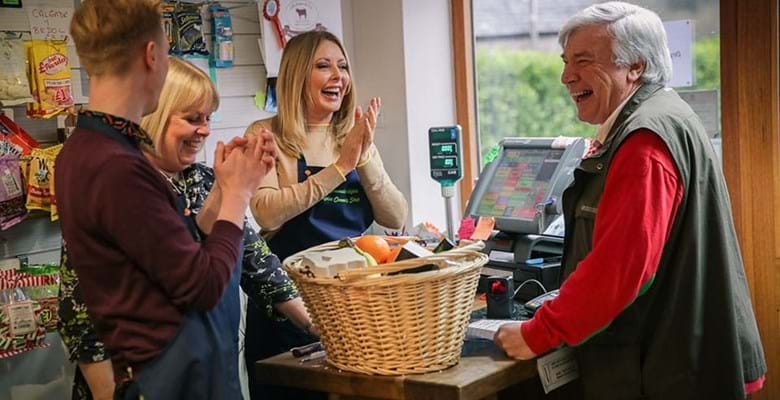
TV and radio presenter, Carol Vorderman, is the first celebrity to take up the Learn Welsh challenge on ‘Iaith ar Daith’, a new entertainment series, which starts on S4C on Sunday, 19 April at 8.00pm. Let's hear from Carol:
Tell us a bit about your background.
I was brought up in two towns, in Prestatyn throughout the 1960s as a child in a single parent family and then beautiful Denbigh for all of the 1970s when Mum married my stepfather (whom I adored). Prestatyn wasn’t particularly Welsh speaking, but a lot of Welsh was spoken around Denbigh.
My mum grew up speaking Welsh, but forgot it all, and wasn’t encouraging of the language. My Taid (who had worn the Welsh NOT as a child) and Uncle Glyn were Welsh speakers, but nobody spoke Welsh. I would hear phrases – tipyn bach, cariad, sut wyt ti - and I could count to 10 but that was about it before I went to secondary school.
I went to the Catholic comprehensive school in Rhyl. I got a Grade A in my O-level Welsh in 1976, but it was very formal - there was little conversation. Mr Palmer Parri was an extraordinary Maths Teacher, who changed my life.
I wish now that there had been more focus on the language - the attitude towards Welsh in the 1960s and 1970s was completely different to the amazing celebration and encouragement there is now.
When I graduated from Cambridge in 1981, my Mum left my stepfather in Denbigh and so that was when Wales and I parted company.
Why did you want to learn Welsh?
I’ve been doing my show on BBC Radio Wales (Saturday, 11.30am-1.30pm) since last June and it’s my favourite job in the world. Owain (Carol’s mentor, Owain Wyn Evans) is often with me and we have a great time – I love laughing.
I covered the Royal Welsh Show for Radio Wales last year and was due to do the show again this year. I wanted to be able to go back and at least understand two-thirds of what is said to me and even tell some jokes badly in Welsh!
Also, I’m moving back to Wales – I’ve got a little house in Pembrokeshire and I’m moving to Cardiff later this year from Bristol.
I cannot even begin to tell you how welcomed I’ve felt – a proper Welsh welcome with so much love and laughter. I’ve listened to the great song, ‘We’ll keep a welcome in the hillside’ more, recently, and I feel every word is true:
We'll keep a welcome in the hillside
We'll keep a welcome in the Vales
This land you knew will still be singing
When you come home again to Wales
This land of song will keep a welcome
And with a love that never fails
We'll kiss away each hour of hiraeth
When you come home again to Wales
I’ve been overwhelmed by the response to me learning Welsh – diolch bob un. I genuinely feel I have a responsibility to come home and do what I can to show my Welshness. Speaking our language is part of that.
How did you find learning Welsh?
I learned so much during our week's filming. This was the first time I had been immersed in the language, and I absolutely loved it. I was starting to think in Welsh and was even dreaming in Welsh!
I am going to spend some time with my cousin Siân, who’s at the same level of Welsh as me and who wants to be fluent. So, I’m going to stay with her and surround myself with Welsh speakers, including Aran Jones, who was our guide on the programme. I met my old Welsh teacher, John Kerfoot Jones, while doing Iaith ar Daith and he is willing to help me too. How brilliant is that!
What was the best thing about your ‘Iaith ar Daith’ challenge?
There were so many things – one of my favourite challenges was giving a maths lesson in Welsh to a group of seven-year olds at Ysgol y Llys, a new Welsh school in Prestatyn. The headteacher told me that 92% of the children had parents who only spoke English. English-speaking parents are sending their children to learn Welsh! So much has changed in three or four generations. My Taid was a tenant farmer at Llys Farm, which Ysgol y Llys is named after. He was forced to wear the Welsh NOT in school, to stop him from speaking Welsh. Now, thanks to Welsh language education, Welsh is something enormous, inclusive, modern and celebratory.
What are your favourite Welsh words?
Dros ben llestri (Over the top); Snogiau Mawr (Big Snogs); and, Ti newydd wasgu fy motwm hapus (it’s something I often say in English ... you just pressed my Happy Button)
What’s your advice for Welsh learners or people thinking about learning Welsh?
Make the most of the resources that are available – there’s a lot of help for people who want to learn. Also, don’t get hung up on mutations and make sure you listen to Welsh on the telly or radio and speak Welsh as much as possible. Don’t worry about getting it wrong – never apologise, every single step is something to celebrate.


